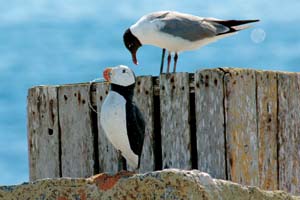 Caption: UNH Ph.D. candidate Jason Goldstein holds a lobster with a temperature logger, an ultrasonic transmitter and a return tag. These items are secured to the lobster like a lightweight backpack to help UNH researchers learn about their migration patterns.
Caption: UNH Ph.D. candidate Jason Goldstein holds a lobster with a temperature logger, an ultrasonic transmitter and a return tag. These items are secured to the lobster like a lightweight backpack to help UNH researchers learn about their migration patterns.
Credit: Rebecca Zeiber, NH Sea GrantTraveling Lobsters?
Questions: How far can a lobster travel?
Answer: about 10 miles in a couple of days...or so say researchers at my alma mater: University of New Hampshire at Durham.
Below you'll find and excerpt of an article on research on the subject of migration of lobsters. Why might the Maine traveling public care? Why not - I don't eat lobster myself, but I find them fascinating and know that my neighbors rely on them and many savor lobsters. To learn more and why it matters check out this link:
UNH Researchers Track Lobster Migrations to Improve Population Estimates: "UNH Researchers Track Lobster Migrations to Improve Population Estimates
Media Contact: Rebecca Zeiber
603-749-1565
NH Sea Grant
December 9, 2008
DURHAM, N.H. - Jason Goldstein checks his lobster traps in New Hampshire's Great Bay Estuary once a week, but not for tasty crustaceans to sell. Instead, the University of New Hampshire Ph.D. candidate is fitting these lobsters with transmitters and tracking their migrations year-round.
Goldstein has tracked lobsters along the New Hampshire coastline and into Great Bay throughout the past two years. This research, funded by N.H. Sea Grant, will provide more accurate information about the sources of juvenile lobsters and interactions between the population stocks in New England. The information could improve the management of this economically valuable fishery, thus allowing lobster to remain front-and-center among the New England menu choices.
Goldstein and UNH professor of zoology Win Watson are particularly interested in the movements of 'berried' females, those carrying eggs. This year, they are comparing the berried females' movements with those of the large- and small-sized males and females without eggs. Where the berried females go, so go their eggs, and those movements likely have implications for New England lobster populations.
'We often go diving one day and there are a lot of lobsters"

 Caption: UNH Ph.D. candidate Jason Goldstein holds a lobster with a temperature logger, an ultrasonic transmitter and a return tag. These items are secured to the lobster like a lightweight backpack to help UNH researchers learn about their migration patterns.
Caption: UNH Ph.D. candidate Jason Goldstein holds a lobster with a temperature logger, an ultrasonic transmitter and a return tag. These items are secured to the lobster like a lightweight backpack to help UNH researchers learn about their migration patterns.